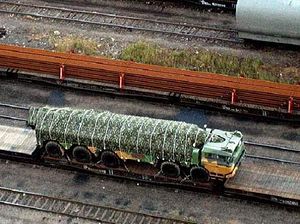China has confirmed it conducted a hypersonic missile test last week, but is downplaying its significance and implications.
As my colleague Ankit wrote earlier this week, “Last week, the Chinese military successfully concluded the first test flight of a hypersonic missile vehicle.” The test was first reported by the Washington Free Beacon, which quoted U.S. military and defense officials.
On Thursday China Daily reported “The Ministry of National Defense issued a statement on Wednesday dismissing media reports that China’s recent ultra-high speed missile test flight was aimed at delivering warheads through the missile defenses of the United States.”
It went on to quote the Ministry of National Defense as saying: “It is normal for China to conduct scientific experiments within its borders according to its plans. The tests were not aimed at any nation nor any specific target.” The report didn’t specify whether the MND judged the test to be successful or not.
The Washington Free Beacon article said that China had developed the missile in order to get pass U.S. missile defenses. Hypersonic missiles pose immense challenges to current missile defense technologies because of their speed, maneuverability and the fact that they travel at lower altitudes than ballistic missiles.
However, Chinese military analysts offered different reasons for America’s concern. One analyst said that the U.S. was concerned about the test because of a lack of mutual strategic trust between the U.S. and Chinese militaries. He added that these mutual misperceptions could be corrected through talks.
A different Chinese defense analyst dismissed U.S. criticism outright on account of the fact that the U.S. spends more on its military than China. “There is no need for the U.S. or any other country to worry about the development of the Chinese military, given that China’s military expenditure is much lower than that of the U.S.,” said Li Qingkong, deputy secretary-general of the China Council for National Security Policy Studies.
They didn’t need to convince Admiral Samuel Locklear, the head of U.S. Pacific Command. In characteristic fashion, Admiral Locklear downplayed the significance of the test, saying he was not particularly concerned about the hypersonic missile, or about China’s growing military capabilities more generally. Instead, he said that the U.S. should encourage China to “come into the security environment as a productive member,” adding “I think we should be more optimistic about the future of China.” He did caution: “It doesn’t mean we should be Pollyannaish either.”
Others in the United States took a less benign view of what the hypersonic missile test said about China’s intentions and military modernization. Directly contracting the MND statement, the Heritage Foundation’s Larry Wortzel told Voice of America, “Chinese military planners really seem convinced that their most likely enemy and their greatest potential threat is the United States. They have a lot of other concerns. Things are not great with Russia even though they buy a lot. Things are a lot worse with Japan. But they focus on us and they focus on our [American] technology.”
Others in China, particularly scientists involved in the missiles construction, are hailing the test as a huge technological achievement. China is just the second nation after the United States to test a hypersonic missile, although Russia is known to be building one in coordination with India.
According to the South China Morning Post, over 100 teams from different Chinese research institutes and universities were involved in building the project. Many confided in the Hong Kong daily that despite the success of last week’s test, there were many outstanding issues that China had to overcome before the hypersonic missiles could enter into active duty.
In particular, they said that Chinese researchers had yet to figure out how to maintain “precise flight control” over the missile when it was flying at such high speeds. Scientists in China were also trying to find “super materials” that could withstand the extreme heat during hypersonic flights.
Wang Yuhui, a researcher on hypersonic flight control at Nanjing University of Aeronautics and Astronautics, told South China Morning Post: “I am sure many tests will be carried out after last week’s flight to solve the problems. It’s just the beginning.”
































